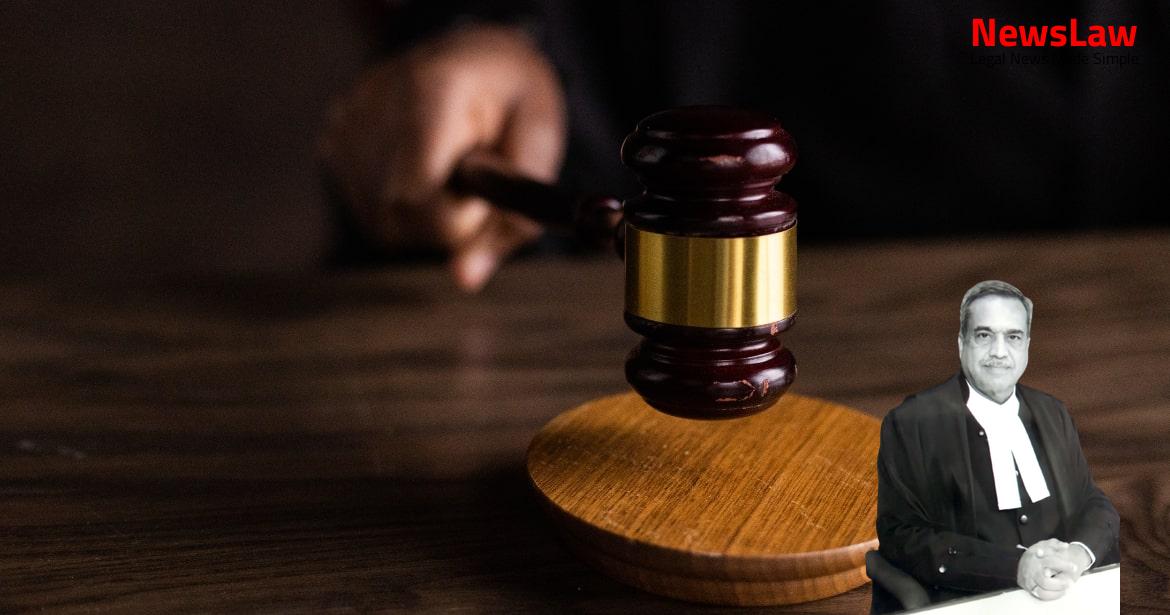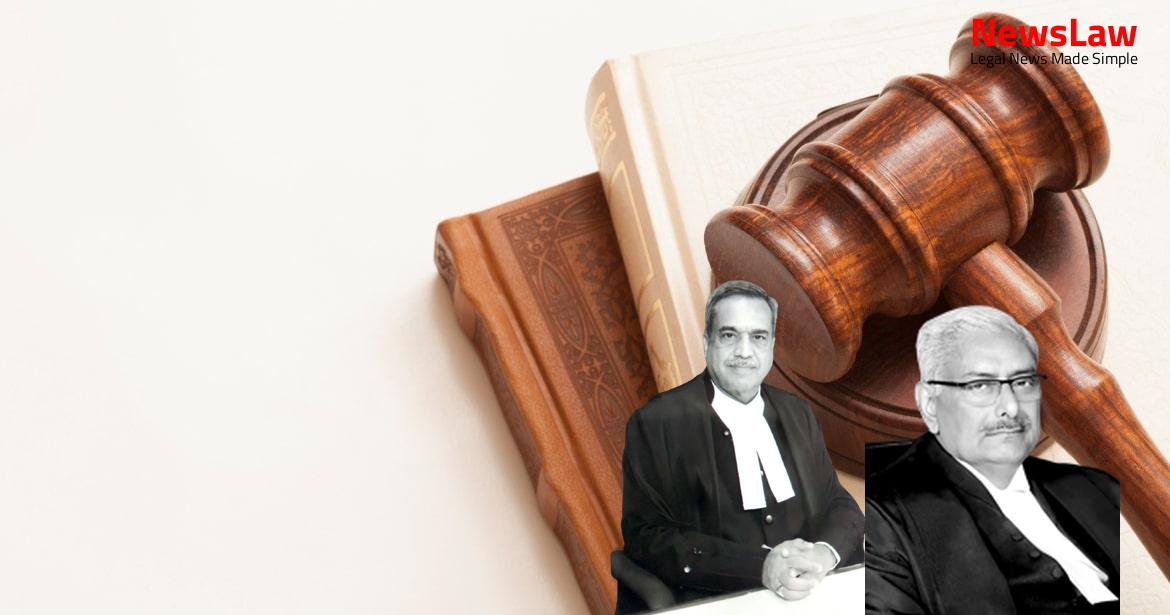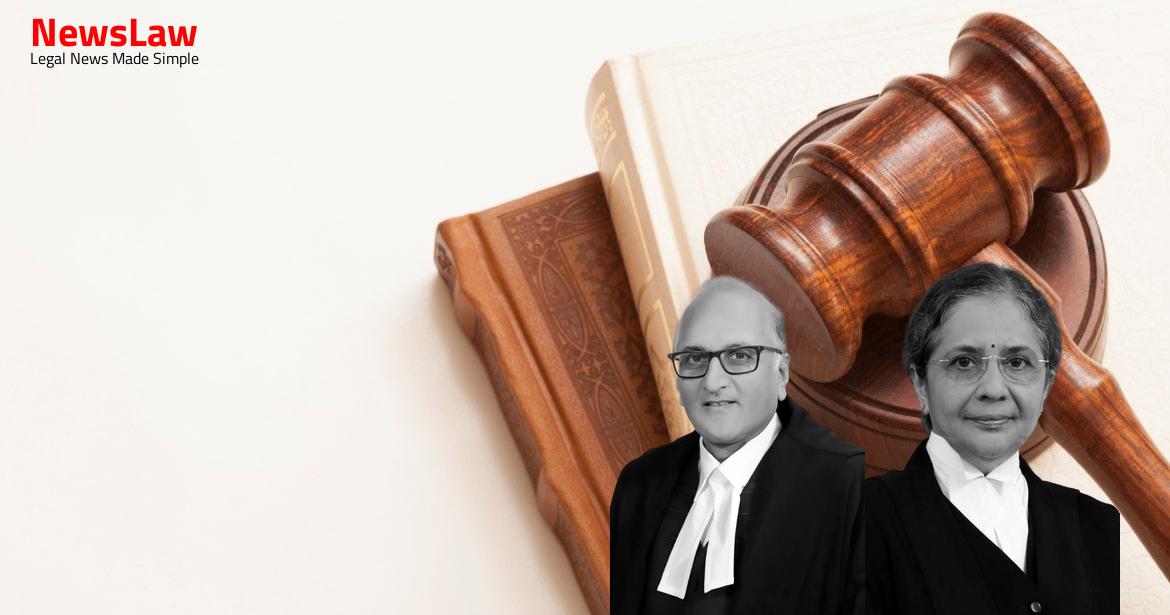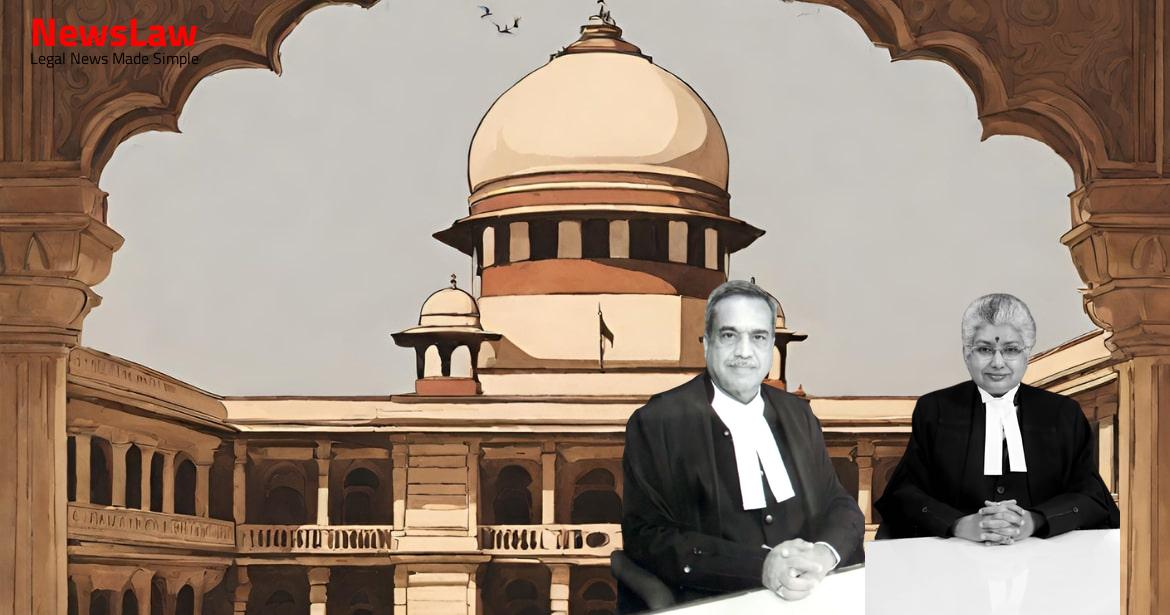The facts leading to the present appeal in a nutshell are as under: That one Braja Mohan Dey was the owner and in possession of ‘Schedule A’ property. Thereafter original plaintiff No.2, by virtue of the said PoA, transferred ‘Schedule A’ property to his wife Gita Rani Saha (original plaintiff No.1) (now deceased) vide sale deed dated 29.09.1968, allegedly for repayment of a sum of Rs. However, on the other hand, it was the case on behalf of the defendants that their predecessor-in-interest held out that Sarat Chandra Majumdar was in possession of the suit land for more than thirty years and was running a business from the said property, while denying that the plaintiffs had acquired any right, title or interest as claimed over the suit land.
3 The learned trial Court vide its judgment and decree dated 11.09.1995 dismissed the suit and held that the plaintiffs were not entitled to relief sought as no right, title or interest was established in favour of plaintiff No.2, inter alia, for want of PoA for proper execution of the sale deed in his favour. 4 Feeling aggrieved and dissatisfied with the judgment and decree passed by the learned trial Court dismissing the suit, the original plaintiffs preferred an appeal before the first appellate Court. The first appellate Court also found that though plaintiff No.2 had acquired title over the suit land on the basis of the sale deed executed by him in his favour on the basis of the PoA alleged to have been executed by its true owner Braja Mohan Dey, but failed to produce the same before the Court and as such in the absence of PoA, genuinity of the sale deed dated 3.9.1968 cannot be presumed to be correct and on the basis of that sale deed, subsequent sale deed dated 29.09.1968 in favour of plaintiff No.1 by plaintiff No.2 also cannot be treated as genuine.
6 In the Second Appeal, the High Court, while admitting the appeal, framed the following substantial question of law: “Whether a sale deed executed by the attorney of the vendor can be challenged by a third party only on the ground that the attorney executive in the deed was not duly authorised by a power of attorney.” Subsequently, the High Court reframed the following substantial questions of law: “1) Whether the endorsement made on the sale deed No.1-10394 dated 3.9.1968 [Exbt.11] in respect of the power of attorney is substantive evidence in respect of the power of attorney authorising the plaintiff No.2 to sell the said land as demised in the sale deed dated 3.9.1968? 8 Feeling aggrieved and dissatisfied with the impugned judgment and order passed by the High Court allowing the second appeal and quashing and setting aside the judgments and orders of the courts below dismissing the suit and consequently decreeing the suit in favour of the original plaintiffs, the original defendants have preferred the present appeal. This is particularly when both the courts below concurrently found that plaintiff No.2 is alleged to have acquired title over the suit land on the basis of the sale deed dated 3.9.1968 executed by him in his own favour on the basis the PoA executed by its true owner Braja Mohan Dey, but failed to produce the same before the Court and as such in the absence of PoA, genuinity of the sale deed dated 3.9.1968 cannot be presumed to be correct.
2
It is further submitted that the High Court, while drawing a statutory presumption, has failed to consider that when execution of the sale deed is doubtful and the cloud over the execution has not been cleared, no statutory presumption could be drawn in respect of existence or regularity of the PoA by virtue of an endorsement, when the PoA which was allegedly executed in a foreign country could not be produced and execution of the PoA has been done contrary to Section 33(1)(c) of the Registration Act. It is submitted that assuming that the plaintiffs were dispossessed from ‘Schedule C’ property of which relief was claimed, then an application/proceeding under Section 6 of the Specific Relief Act could have also been filed, which was not done because the plaintiffs in the suit knew that there was a cloud in their title to the suit land. It is submitted that having found that non-production of the PoA by the plaintiffs would come in their way, and in fact had gone against them, the plaintiffs tried to make out altogether a new case by averring that the copy of the PoA was handed over to original defendant No.1 and despite several requests, he never returned the same. It is submitted that in the present case, the High Court ought to have decided the issue of non- production of PoA by the plaintiffs in the first instance and then would have drawn the statutory presumption.
3.10 It is further submitted that Section 65 of the Indian Evidence Act provides for circumstances under which secondary evidence may be given without filing primary evidence. It is submitted that the said finding is erroneous inasmuch as the statutory presumption would not be available to the plaintiffs and the documents in question since the document (PoA) itself has not been produced before the courts below to ascertain whether the document was in order or in compliance of Section 33(1)(c) of the Registration Act. Therefore, it is prayed to allow the present appeal and set aside the impugned judgment and order passed by the High Court and restore the judgment and decree passed by the learned trial Court. Plaintiff No.2 informed the concerned police station and thereafter made a prayer before the Court of the SDM, Sardar for drawing up proceedings under Section 144 Cr.P.C. It is submitted that as there was an endorsement in the sale deed and that it is a vital piece of evidence, the High Court has not committed any error in drawing the statutory presumption. 5 It is further submitted that Section 34 of the Registration Act contemplates an enquiry which relates to various aspects mentioned in sub-clause (3) including (i) enquiring into the fact as to whether such document was executed by the persons by whom it purports to have been executed; (ii) satisfying himself as to the identity of the persons appearing before him; and (iii) in case of any person appearing as a representative assign or agent satisfying himself as to the right of such person so to appear. Therefore by virtue of Section 60(2) of the Registration Act, there is a statutory presumption which arises to the effect that the document has been registered in the manner provided by the Act, which means that it has been registered after due compliance of the enquiry contemplated under Section 33(1) (c) and 36 of the Registration Act.
8 Relying upon the recent decision of this Court in the case of Amar Nath (supra), it is submitted that as observed and held by this Court that when a PoA holder executes the sale deed, he executes in terms of Section 32(a) of the Registration Act and therefore he does not need to produce the PoA. Both, the learned trial Court as well as the first appellate Court held that the plaintiffs have failed to prove their title as the PoA on the basis of which plaintiff No.2 claimed the right/title is not forthcoming and/or not produced before the Court. However, by drawing the statutory presumption under Section 60 of the Registration Act, the High Court has believed the sale deeds dated 3.9.1968 and 29.09.1968 and has held that the plaintiffs have proved their title. Sections 32 and 33 of the Registration Act, which are relevant for our purpose, read as under: “ 32. For the purposes of Section 32, the following powers-of- attorney shall alone be recognized, namely— ( a ) if the principal at the time of executing the power-of-attorney resides in any part of [India] in which this Act is for the time being in force, a power-of-attorney executed before and authenticated by the Registrar or Sub-Registrar within whose district or sub-district the principal resides; ( b ) if the principal at the time aforesaid resides in any part of India in which this Act is not in force, a power-of-attorney executed before and authenticated by any Magistrate; ( c ) if the principal at the time aforesaid does not reside in [India], a power-of attorney executed before and authenticated by a Notary Public, or any Court, Judge, Magistrate, Indian Consul or Vice-Consul, or representative of the Central Government: Provided that the following persons shall not be required to attend at any registration-office or Court for the purpose of executing any such power-of-attorney as is mentioned in clauses ( a ) and ( b ) of this Section, namely— ( i ) persons who by reason of bodily infirmity are unable
(2) In the case of every such person the Registrar or Sub-Registrar or Magistrate, as the case may be, if satisfied that the power-of- attorney has been voluntarily executed by the person purporting to be the principal, may attest the same without requiring his personal attendance at the office or Court aforesaid.
As per Section 32 of the Registration Act, every document to be registered under the Registration Act shall be presented at the proper registration office by some person executing or claiming under the same, or, by the agent of such a person, representative or assign, duly authorised by PoA executed and authenticated in the manner mentioned in Section 33(1)(c) of the Registration Act. By drawing the statutory presumption and without properly appreciating and/or considering the fact that there is a non-compliance of Section 33(1)(c) of the Registration Act there cannot be any statutory presumption, the High Court has set aside the concurrent findings recorded by both the courts below, in exercise of powers under Section 100 CPC. Once he became the owner on the basis of a registered sale deed dated 3.9.1968, which was executed by him in his own name as a PoA of the original owner, he could have executed the sale deed in favour of plaintiff No.1 as the owner and not as a PoA of the original owner. Having found and realised that the non-production of the PoA had gone against them, subsequently, before the first appellate Court, the plaintiffs sought to make out a case that the PoA was handed over by plaintiff No.2 to original defendant No.1 and that despite his demands, never returned the same. In view of the above and for the reasons stated above and as the PoA is not produced on record; the executant of the PoA in favour of plaintiff No.2 has not stepped into the witness box; there is a non- compliance of Section 33(1)(c) of the Registration Act; and the plaintiff no.2 is claiming title on the basis of the PoA alleged to have been executed by the original owner which is not forthcoming and that plaintiff no.1 is claiming the title on the basis of the sale deed dated 29.09.1968 executed by plaintiff No.2 as a PoA holder of the original owner which is not forthcoming, I am of the opinion that the learned trial Court was justified and right in dismissing the suit and refusing to pass a decree for a declaration of title in favour of the plaintiffs.
Also Read: https://newslaw.in/case-type/civil/acquisition-of-land-and-deemed-lapse-under-the-act-2013/
The impugned judgment and order of the High Court is unsustainable both, on law as well as on facts. The impugned judgment and order passed by the High Court decreeing the suit is hereby quashed and set aside and the judgment and decree passed by the trial Court, confirmed by the first appellate Court, is hereby restored. By the impugned judgment, the judgment and decree dated 26 August, 2004 passed in Title Appeal No 02 of 1996 by the First Appellate Court, i.e., the Court of the District Judge, West Tripura, Agartala, affirming the judgment and decree dated 11 September, 1995 in Trial Suit No 201 of 1985 has been set- aside.
2 executed and registered a sale deed dated 03 September 1968 in his own favour as the attorney on behalf of the seller, Braja Mohan Dey.
(v) That on one portion of the suit property described as schedule ‘A’ property in the plaint, plaintiff no. That the land falling to the eastern side of schedule ‘A’ property, described as schedule ‘B’ property in the plaint, was sold by plaintiff no. (vii)
Thereafter, the Executive Magistrate took cognizance of Miscellaneous Case No 02 of 1981 and by an order dated 13 July, 1984 directed the defendants to vacate the suit premises, failing which, possession thereof would be forcefully recovered with the aid of police authorities.
In response to the plaint, the defendants filed a written statement the contents of which are encapsulated as under:- (i) The fact that Braja Mohan Dey was the original owner and possessor of the suit property, was denied. With the aforesaid averments, it was prayed before the Trial Court that the suit for declaration of title and recovery of khas possession of the suit land, filed by the plaintiffs, be dismissed. The salient findings of the Trial Court are as under: That the sale deed dated 03 September, 1968 did not contain an endorsement by the Sub-Registrar to the effect that the sale deed was executed by plaintiff no. 2 could not be said to have any right, title or interest over the suit property. The relevant findings of the first appellate court are encapsulated as under: That the plaintiffs failed to prove that the power of attorney was handed over to defendant no. When a registering authority has made an endorsement accepting that by virtue of a power of attorney, the attorney was allowed to execute the sale deed, a statutory presumption ought to be drawn as to the fact of validity of the power of attorney and consequently of the sale deed. That the Trial Court and first appellate court had wrongly shifted the onus on the plaintiffs, while the burden ought to have been on the defendants to prove their case which was contrary to the statutory presumption of validity of the sale deed dated 03 September, 1968. That the High Court committed a serious error in law while setting aside the concurrent findings of the Trial Court and first appellate court to hold that the sale deed dated 03 September, 1968 was valid even though the power of attorney forming the basis of such sale deed was neither produced nor proved. That a power of attorney executed in a foreign country, in order to be valid would have to be executed in accordance with Section 33 (1) (c) of the Registration Act, 1908. That assuming for the sake of argument that the suit was not defended by the defendants, the plaintiffs would still have to prove their title in order to be entitled to a decree.
That since the Sub-Registrar had accepted the sale deed dated 03 September, 1968 for registration, it is to be presumed that the Sub-Registrar had done so only on satisfying himself as to the fact that the person who was executing the document was the proper person and competent to do so. In that regard, it was contended that since the sale deed dated 03 September, 1968 was a registered document, a statutory presumption may be drawn as to the fact that the registration was completed after due compliance of the provisions of the Act. Whether non-production of the document of power of attorney before the Trial Court and the first appellate court would be fatal to the case of the plaintiffs? Sections 67 and 85 of the Indian Evidence Act, 1872, reads as under: Section 17 of the Registration Act speaks about documents of which registration is compulsory, while Section 18 deals with documents of which registration is optional. Since, a power of attorney does not come within the ambit of Section 17 or clause (a) to (e) of Section 18, registration of a power of attorney is optional. A power of attorney has a special authority to present a document on behalf of the principal at the registration office vide Chottey Lal vs The Collector of Moradabad A.I.R. (ii) Under Section 33 (1) (c), if a power of attorney has been executed before and authenticated by Magistrate, 1 Class of Komilla (Bangladesh) authorising the attorney to execute a sale deed for a house in India, it is sufficient to prove its execution vide Atal Chakravarty vs Sudhi Gopal Pandey (1969) 73 CWN 947.
Also Read: https://newslaw.in/case-type/civil/taxation-of-engineering-design-drawings-goods-or-services/
Sections 34 and 35 state what a registering officer has to see before registering a document. Once satisfied as to such particulars as are stated under Sections 34 and 35, he cannot refuse to register a document except mentioned under grounds in Section 35(3). (iv) Section 58 speaks about particulars to be endorsed on documents admitted for registration, namely: a) the signature and addition of every person admitting the execution of the document, and, if such execution has been admitted by the representative, assign or agent of any person, the signature and addition of such representative, assign or agent; b) the signature and addition of every person examined in reference to such document under any of the provisions of this Act; and c) payment of money or delivery of goods made in the presence of the registering officer in reference to the execution of the document, and any admission of receipt of consideration, in whole or in part, made in his presence in reference to such execution. On compliance of Sections 34, 35, 58 and 59 as they apply to a given document, the registering officer shall endorse a certificate containing word “Registered” on the document itself and indicate the number and page of the book in which the document has been copied. In the instant case, what is sought to be proved is title by the sale deed and not the power of attorney as it is the sale deed which conveys title and the sale deed has been executed in accordance with the provisions of Registration Act, 1908, and proved in accordance with Section 67 of Evidence Act.
In order to determine whether the statutory requirements of Section 33 (1) (c) of the Registration Act, 1908 had been complied with while executing the power of attorney, the recitals of the sale deed dated 03 September, 1968 may be referred to. That due to the need for construction of huts and for urgent family expenditure, the seller Braja Mohan Dey had approached the buyer, that is, Sri Dhirendra Chandra Saha, (plaintiff No.2) to lend some money, as the buyer was the tenant of the said land (suit schedule property) and the buyer agreed to lend the money to the seller. In Annexure CA – 2 (Exhibit – 12), which is a copy of the sale deed dated 29 October, 1968 the following recitals are recorded: That the schedule land is in absolute ownership and possession of the owner namely, Sri Dhirendra Chandra Saha (plaintiff No.2) by virtue of a registered sale deed dated 03 September, 1968. On a conjoint reading of the aforesaid two documents, namely sale deeds, it is established that the initial sale deed dated 03 September, 1968 by plaintiff No.2 Sri Dhirendra Chandra Saha is as a power of attorney holder of Braja Mohan Dey, to himself as a buyer. The power of attorney is dated 01 August, 1968, the details of which are referred to in the said sale deed inasmuch as the power of attorney was executed by the original owner Sri Braja Mohan Dey before the 1 Class Magistrate, Komilla, East Pakistan, which is evident on a reading of both the documents.
2, had the authority as per Section 32 (c) to present a document for registration in his capacity as the attorney of Braja Mohan Dey, the original owner of the suit property. However, the plaintiff challenged the sale made in favour of the first defendant, inter-alia, on the ground that the second defendant could not have executed a sale deed in the absence of the original power of attorney and the sub-registrar was required to verify this aspect from the second defendant. This Court in a Civil Appeal challenging the decision of the High Court, set aside the same and held that a power of attorney holder, while executing a sale deed, need not produce the original document conferring power of attorney. The admission of the signature of the said document by plaintiff No.2 is proof of the signature on the document which is sufficient for proof of the document of sale deed of sale in favour of plaintiff No.1.
The appellants-defendants herein contended that that there may be a statutory presumption as per Section 60 of the Registration Act, 1908, only where all other requirements of execution of sale deed are complied with and there is no doubt as to the genuineness of the power of attorney. Since the requirements of execution of a sale deed are duly complied with, and there is no reason to doubt the recitals of the sale deed which has been proved in accordance with law, it would follow that the statutory presumption under Section 60 of the Registration Act could be invoked in the instant case. The Privy Council noted that since the sub-registrar had accepted the document for registration, it is prima-facie evidence that the conditions have been satisfied and after registration of the document, the burden of proving any alleged infirmity rests on the person who challenges the registration.
This Court, while holding that no case of fraud was made out, upheld the validity of the GPA and the sale deed executed on the strength of the GPA. Prima- facie, the endorsement made on the sale deed dated 03 September, 1968, could be considered as determinative evidence of the conveyance of title to the suit property by its original owner, especially where the defendants have not set up a case to establish any independent title over the suit property. 69/1974 records that by way of a sale deed dated 03 September, 1968, Plaintiff No 2 had purchased the suit property and was paying municipal taxes as the owner of the premises which finding is binding on the parties herein as the same has not been upset by any Court of law. But the defendants have not led any evidence in order to rebut the presumption as might be drawn on the basis of the said endorsement on the body of the sale deed No.1010394, dated 03.09.1968 accepting original plaintiff no.2 as the attorney of the original owner, Braja Mohan Dey. The High Court is further right in holding that original plaintiff no.2 was duly nominated and constituted as the attorney of Braja Mohan Dey (original owner of the suit land) and on the strength of the said power of attorney, plaintiff No.2 transferred land in favour of himself. Parties are directed to bear their respective costs.
Case Title: MANIK MAJUMDER Vs. DIPAK KUMAR SAHA (D) THR. LRS. (2023 INSC 34)
Case Number: C.A. No.-002965-002965 / 2022



